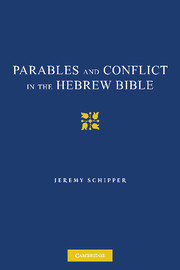Book contents
- Frontmatter
- Contents
- Preface
- Abbreviations
- 1 Breaking Down Parables: Introductory Issues
- 2 Devouring Parables: Jotham's Parabolic Curse in Judges 9
- 3 Overallegorizing and Other Davidic Misinterpretations in 2 Samuel 11–12
- 4 Changing Face and Saving Face: Parabolic Petitions in 2 Samuel 14
- 5 Grasping the Conflict: Ahab's Negotiation of Conflicts and Parables in 1 Kings 20
- 6 Intellectual Weapons: The Parable's Function in 2 Kings 14 and 2 Chronicles 25
- 7 Conclusions and Implications for the Study of Hebrew Bible Parables
- Notes
- Works Cited
- Scriptural and Extra-Biblical Texts Index
- General Index
7 - Conclusions and Implications for the Study of Hebrew Bible Parables
Published online by Cambridge University Press: 30 September 2009
- Frontmatter
- Contents
- Preface
- Abbreviations
- 1 Breaking Down Parables: Introductory Issues
- 2 Devouring Parables: Jotham's Parabolic Curse in Judges 9
- 3 Overallegorizing and Other Davidic Misinterpretations in 2 Samuel 11–12
- 4 Changing Face and Saving Face: Parabolic Petitions in 2 Samuel 14
- 5 Grasping the Conflict: Ahab's Negotiation of Conflicts and Parables in 1 Kings 20
- 6 Intellectual Weapons: The Parable's Function in 2 Kings 14 and 2 Chronicles 25
- 7 Conclusions and Implications for the Study of Hebrew Bible Parables
- Notes
- Works Cited
- Scriptural and Extra-Biblical Texts Index
- General Index
Summary
“Don't you know what these things mean?”
–Ezekiel 17:12“Who is like the wise person and who knows the interpretation of a word?”
–Ecclesiastes 8:1aThis final chapter expands on the conclusions of the previous chapters and examines their implications for the study of parables found elsewhere in the Hebrew Bible, especially in the Latter Prophets. The previous chapters built the case that the prose contexts of Hebrew Bible parables call into question scholarly assumptions about their rhetorical function. In short, we found that parables (1) intensify announcements of judgment and condemnation rather than call for a change of behavior or facilitate conflict resolution; and (2) perform this intensifying function by invoking specific genres to address the speaker's specific communicative needs. Moving beyond the prose portions of the Hebrew Bible, this chapter tests this thesis further by briefly examining selected parables from Ezekiel and First Isaiah. We will use Isa 5:1–7 and Ezek 17:1–24 as test cases.
ISAIAH 5:1–7
In v. 1a, Isaiah refers to the following verses as a “song” (shir) for his beloved. In the most general sense, we could refer to this passage as a song mashal since Isaiah bases his comparison (v. 7) on a song (vv. 1–2). The fact that Isaiah refers to this passage as a song does not mean it does not contain a narrative. Though unlike Ugaritic literature the Hebrew Bible does not contain long narrative poetry, it does contain brief poetic vignettes, as we find in Isaiah's song.
- Type
- Chapter
- Information
- Parables and Conflict in the Hebrew Bible , pp. 111 - 124Publisher: Cambridge University PressPrint publication year: 2009



